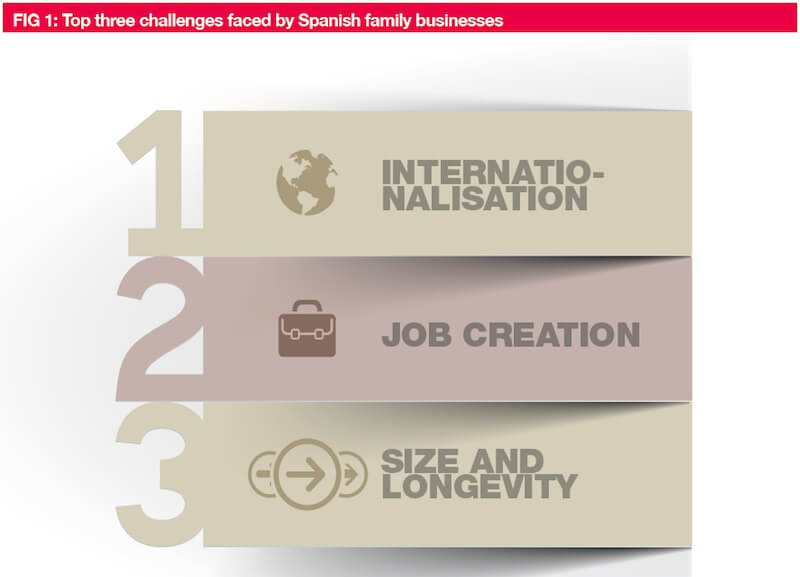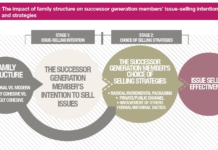Not long ago, the Spanish economy was booming. The unemployment rate was less than 8% and the country was among the top ten high-performing economies in the world. Today, the picture has changed dramatically: Spain is struggling to recover from the devastating effects of the global financial crisis, best illustrated by the country’s 27% unemployment rate and loss of 276,000 companies (Family Business Institute). Boris Matijas, Director and Founder of Archipiélago, explores in the following report just how family businesses in Spain have been affected by the current economic downturn and how they can champion a new outlook aimed at recovery.
The Business Families of Spain
Of the thousands of businesses that have disappeared during the economic downturn in Spain, it is not known how many were family-owned. It can be easily deduced however, that many family firms were affected. According to the Spanish Family Business Institute, family businesses account for 85% of the Spanish business sector, 70% of national GDP and 70% of employment in the private sector.
The role of family businesses in Spain has always been of paramount importance. Among their main intrinsic advantages lies their capability to improvise and adjust to circumstances, their experience, their network and their knowhow, which has oftentimes been handed down for generations to come. But above all it is the families’ ability of compromise and patience, via their long-term strategic outlook, which have allowed them to endure turbulent times.
[ms-protect-content id=”4069, 4129″]
The current market forces in Spain paint a harsh picture. A seemingly natural elimination process has occurred in which those enterprises that were highly indebted and had a short-term strategic outlook were forced to pay a high price. The companies which outlasted the downturn will undoubtedly emerge stronger for it.
Challenges remain for the family businesses which have survived. They include:
- Internationalisation
- Job creation
- Size and longevity
Internationalisation
Seen from the inside, Spain presents an image of desolation in which people struggle to make ends meet. There is another more hopeful perspective however; one that gives reason for optimism and originates from beyond the country’s borders. Spanish companies, propelled by the fall of domestic demand, have their eyes set on the international market. This presents one of the greatest challenges and opportunities for the nation’s family businesses.
According to the Real Instituto Elcano, Spain has achieved significant progress since its economic collapse and Spanish family businesses have played a major role. One clear example can be found in the efforts of the Council for Business Competiveness. This think tank, created by the Family Business Institute and several major Spanish multinational companies, has been campaigning for more than two years to achieve an improvement of the country’s economic competitiveness and its international confidence. The positive image that recognised Spanish companies enjoy internationally played a significant role. Eight out of fifteen Council members are large family businesses such as Santander Bank, Mango and Inditex, among others.
These major family businesses have taken the responsibility to promote the country’s competiveness and the rest of the family business community has picked up this momentum, placing Spain second in exports among European economies.
Nevertheless there is still a long road to walk to bring SMEs up to speed in order to play a more significant role in this newfound surge of internationalisation. Compared with Spain’s non-family businesses, family-owned companies have traditionally been slower in expanding abroad and when doing so they were looking for ‘psychologically close’ markets such as EU and Latin America markets, as detected in an IESE Business School study.
Among the main obstacles found when attempting to move further afield have been the company’s size and structure. An additional impediment related to the family’s culture has been the difficulty found in getting family members to leave the comfort of their lives in Spain and venture abroad.
The crisis and the generational shift have played an important role in changing the mentality and today we see many Spanish family-owned companies expanding their activities all around the globe. Within this trend, succession plays a very important role. Most Spanish family businesses have passed from the baby boomer generation, born soon after the Second World War, to Generation X, which now leads most of the family operations. These companies have been built in a very different context than those emerging today. They have mainly grown through a transitional period which began with Franco’s dictatorial regime to present day EU integration. Next in line Generation X, still under the strong influence of the conservative baby boomer mentality, timidly started to expand; though mainly in the EU market. But today’s Generation Y is pushing forward. Freed from territorial attachments these ‘worldwide citizens’ are expanding their family businesses all around the planet.
Job creation
“Unfortunately, the exterior sector is not enough”, stated José Manuel Entrecanales, president of Family Business Institute and Acciona, during the XVI IEF annual conference. Job creation is one of the most serious challenges that Spanish family businesses face. Without job creation internal demand will continue to fall and thus make it difficult to compensate for the 17% decrease in GDP since the beginning of the crisis. Internal consumption is at the same level it was one decade ago, when the population was nearly 5 million less and joint investment decreased to the levels they were 15 years ago.
According to the Ernst & Young report ‘The Role of Family Business in the European Economy’ (2009), in the years prior to the crisis, between 2005 and 2007, the Spanish family business model created more employment than in any other European country.
Today, with more than 5 million citizens unemployed, it seems that Spain has sunk to the bottom and is now slowly recovering as a result. On a macro scale, some experts say that the country will benefit from the current situation as it has pushed labour costs down sharply and subsequently allowed Spain to more ably compete with high-output nations. Additionally, the companies that fired temporary workers during the downturn will be more likely to rehire employees once conditions improve.
Family businesses play a significant role in the future of job creation and there is one specific element that will allow them to amplify their impact. The economic crisis has changed the country’s mentality and societal promotion of entrepreneurial spirit hints at higher returns for job seekers in the coming years.
Until recently Spain had almost the same number of civil servants as entrepreneurs. Before the crisis started 80% of Spanish university students, according to a Valencia University study, desired to be employed in public service or administration. According to Global Entrepreneurship Monitoring only 30% of the population thought of starting their own business, compared to 56% in the USA. Today, things have changed and there are more university students indicating an interest in establishing their own companies or working in the private sector.
Size and Longevity
Compared to the rest of the EU, a key characteristic of Spain’s economic fabric is a high percentage of micro, small and medium sized companies (99.9%) and the resultant minority of large companies. The mortality rate shows that 53% of Spanish companies do not survive for more than four years (Chamber of Commerce).
Bearing in mind that 85% of these companies are family-owned, the abovementioned trends often lead to an erroneous assumption that family businesses are mainly small companies with low life expectancy. In a recent study conducted by IESE Business School Chair, this assumption has been proven wrong.
Examining a total of 2,254 companies with more than 50 million euros in revenue, the IESE concluded that 57% of the companies were family-owned. In addition, among the sampled companies four were more than 100 years old, and all four are family-owned.
65% of all family businesses in Spain are in their first generation of operation, 25% in their second generation and only 9% in the third generation (Family Business Institute). More than 700 of them are more than 100 years old (Nexia Foundation). Only three Spanish family businesses are among the world’s 250 largest companies.
These statistics as well as history show that the potential for growth and longevity is high. This will naturally depend on micro and macroeconomic tendencies and circumstances, but also on the families’ commitment to consistency and a common vision.
Outlook
While analysts have consistently reported on the untimely decline of the Spanish economy, a new reality has emerged for just how to escape the clutches of the recession. Family firms and SMEs have long provided the country with a vital majority of its revenue and this contingent of the economy will continue to provide an essential lifeline. How these companies adjust to widespread calls for modernisation via continued internationalisation will determine just how successful Spain proves to be in battling back. Relying solely on domestic returns is no longer an option while balance sheets dwell in the red. An order of entrepreneurial fervour has risen from the nation’s current situation and will hopefully aid in overcoming what’s ahead whilst changing the psyche of the university sector as it prepares tomorrow’s graduates.
Spanish family businesses will continue to be expected to seize all opportunities, which help their firms overcome the country’s dreary economic situation. That this is no easy feat considering the low morale in the national economy goes without saying. However, business families must engage with each other to seize the responsibility for their country’s recovery by addressing the above challenges and creating a legacy that will be able to benefit from a recovered and growing economy as well as provide the stepping stones for the next generation.
Tharawat Magazine, Issue 21, 2014
[/ms-protect-content]














